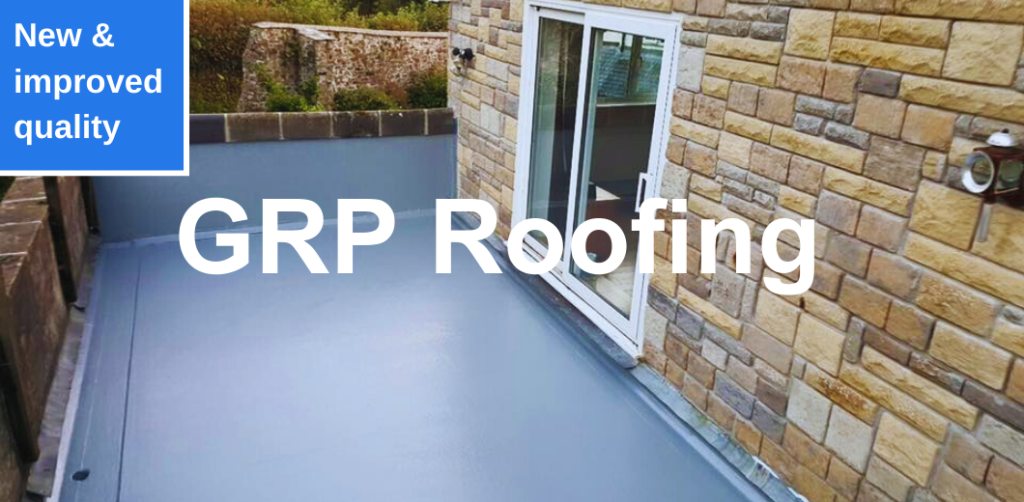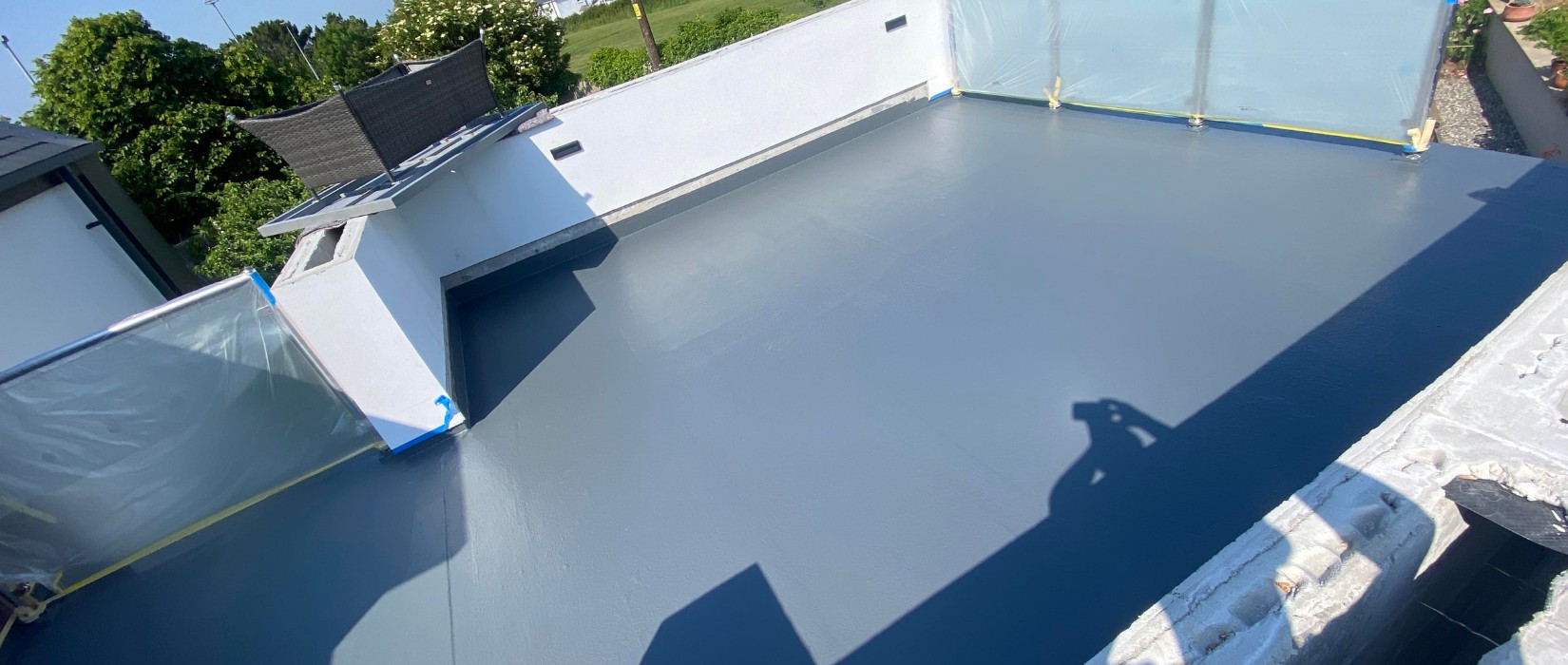GRP Roofing insight No1
GRP Roofing Insight No1 Introduction: When it comes to roofing materials, GRP (Glass Reinforced Plastic) has gained significant popularity for its durability, versatility, and ease of installation. In this comprehensive insight, we’ll delve into the world of GRP roofing, exploring what it is, its applications, benefits, installation process, cost considerations, and impressive lifespan.

1. What does GRP stand for?
GRP stands for Glass Reinforced Plastic, also known as fiberglass. It is a composite material made up of a plastic matrix reinforced with fine glass fibers. This combination results in a strong, lightweight, and weather-resistant material ideal for various applications, including roofing.
2. What is GRP Roofing?
GRP roofing involves using Glass Reinforced Plastic to create a seamless and robust roofing system. The process typically involves applying layers of fiberglass matting and resin onto the roof surface, creating a watertight and durable membrane. GRP roofs are renowned for their longevity and ability to withstand harsh weather conditions.
3. Industries/Applications for GRP Roofing use: GRP Roofing insight No1
GRP roofing finds application in a wide range of industries due to its exceptional properties. Some common applications include:
- Residential buildings
- Commercial properties and offices
- Industrial warehouses
- Educational institutions
- Sports facilities
- Agricultural buildings
4. Benefits of GRP Roofing: GRP Roofing insight No1
a. Waterproof and Leak-Proof: The seamless nature of GRP roofs ensures there are no joints or weak points, making them highly resistant to water penetration and leaks. b. Durability: GRP roofs are known for their exceptional longevity, requiring minimal maintenance over their extended lifespan. c. UV Resistant: GRP roofing materials can withstand prolonged exposure to UV rays without deteriorating or losing their effectiveness. d. Lightweight: Being lightweight, GRP roofs exert less pressure on the building’s structure, making them suitable for a variety of constructions. e. Versatility: GRP roofing can be used on flat, pitched, and even curved roofs, adapting to different architectural designs. f. Green Roof Compatible: GRP roofs can be combined with green roofing systems, adding an eco-friendly touch to the building.
5. How much does GRP roofing cost?: GRP Roofing insight No1
The cost of a GRP roof kit depends on various factors, such as the size of the roof, the complexity of the project, and the quality of materials used. While the initial cost may be higher than some traditional roofing options, the long-term savings due to its durability and low maintenance make it a cost-effective choice.
- Considering the cost? Our pricing structure is transparent and straightforward. To calculate the average cost per square meter, divide the total kit cost by the area it covers. For our 50 square meter kit priced at £632.19 excluding VAT, the average cost is approximately £12.64 per square meter. Rest assured, we guarantee that all our kits contain the correct volumes of materials, with an additional 5 to 10% for your peace of mind.
6. How to Fibreglass a roof:
Fibreglassing a roof involves several essential steps, including surface preparation, application of resin and matting, curing, and finishing. Hiring a professional installer is recommended for achieving the best results, as proper technique and expertise are crucial for a successful GRP roof installation.
7. How Long does GRP roofing last?
When installed correctly and adequately maintained, GRP roofs can last for over 30 years, making them an excellent investment for property owners. Regular inspections and minor repairs, if needed, can further extend the roof’s lifespan.
Durability: A Shield Against the Elements
Extreme Temperature Resistance: GRP roofing can withstand temperatures ranging from -40°F to 180°F, making it suitable for various climates and weather conditions.
Impact Resistance: GRP roofing can withstand hailstones up to 2 inches in diameter without damage, protecting your home from hailstorms.
UV Resistance: GRP roofing is impervious to UV rays, preventing fading and ensuring the longevity of your roof’s color.
Fire Resistance: A Pillar of Safety
Classified as a Class A Fire Retardant: GRP roofing is the highest rating for fire resistance, providing a superior level of protection against fire hazards.
Flame Retardant Properties: GRP roofing’s composition makes it difficult for flames to spread, reducing the risk of fire damage.
Self-Extinguishing Ability: GRP roofing extinguishes itself upon removal of the ignition source, further minimizing fire hazards.
Lightweight Construction: Reducing the Load
Significantly Lighter than Asphalt Shingles: GRP roofing weighs approximately half that of asphalt shingles, reducing the load on your roof structure.
Less Stress on Foundations: GRP roofing’s lightweight design puts less strain on your home’s foundations, minimizing the risk of structural damage.
Ideal for Roofs with Limited Support: GRP roofing is a suitable choice for roofs with limited structural support due to its lightweight nature.
GRP Roofing insight No1, Flexibility: Adapting to Movements
Acclimates to Temperature Fluctuations: GRP roofing’s flexible structure allows it to expand and contract with temperature changes without cracking or breaking.
Resists Thermal Stresses: GRP roofing’s flexibility helps it withstand the expansion and contraction caused by temperature extremes, preventing damage.
Suitable for Movement-Prone Roofs: GRP roofing is a good option for roofs that experience seasonal movements due to temperature changes.
Low Maintenance: A Minimal Investment
Minimal Cleaning Requirements: GRP roofing’s smooth surface requires infrequent cleaning, reducing the need for maintenance.
Resists Debris and Algae Growth: GRP roofing’s non-porous texture prevents debris and algae from accumulating, further minimizing maintenance needs.
Longer Lifespan Reduces Repair Frequency: GRP roofing’s durability extends its lifespan, reducing the need for frequent repairs and maintenance costs.
Efficient Energy Management: Conserving Resources
Reflects Heat and Reduces Cooling Costs: GRP roofing’s reflective properties help keep heat out during hot summer months, reducing cooling costs.
Improves Energy Efficiency: GRP roofing’s ability to reflect heat contributes to energy efficiency and can lower your overall energy consumption.
Environmentally Friendly Choice: GRP roofing’s energy-saving features contribute to a more eco-friendly and sustainable building approach.
Aesthetic Versatility: Customising Your Roof
Variety of Colors and Styles: GRP roofing comes in a wide range of colors and styles to match any architectural design.
Sleek Modern Aesthetics: GRP roofing’s sleek and modern appearance complements contemporary homes and buildings.
Rustic Farmhouse Charm: GRP roofing can also be designed to achieve a rustic farmhouse aesthetic, blending seamlessly with traditional homes.
Investing in a Sustainable Future:
Recycled Content: GRP roofing often incorporates recycled materials, reducing its environmental impact.
Longer Lifespan Reduces Waste: GRP roofing’s extended lifespan reduces the need for frequent replacements, minimizing waste generation.
Sustainable Choice for the Environment: GRP roofing’s combination of recycled content and extended lifespan makes it a sustainable option.
Cost-Effectiveness: A Sound Investment
Initial Investment: While GRP roofing may have a higher initial investment compared to traditional materials, its lower maintenance costs and energy savings can offset the difference over time.
Long-Term Savings: GRP roofing’s durability extends its lifespan, reducing the need for frequent repairs and replacement, leading to long-term cost savings.
Value-Added Investment: GRP roofing can enhance the value of your home and improve its resale potential.
Conclusion: GRP Roofing insight No1
GRP roofing has emerged as a leading choice for roofing applications, offering a compelling combination of durability, energy efficiency, and low maintenance. Its ability to withstand the elements, resist fire, and complement various architectural styles makes it an attractive option for both residential



